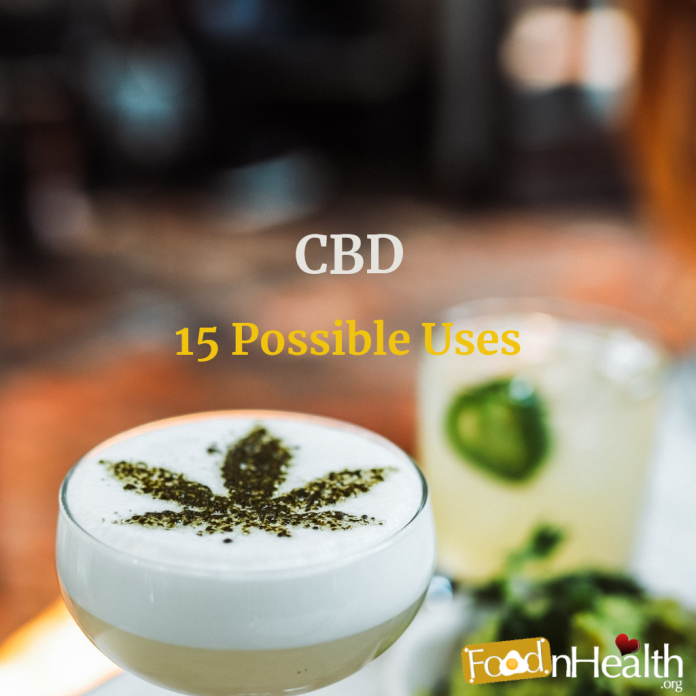Cannabidiol (CBD) products have attracted huge interest as a medicine, a cosmetic and fitness aid and more. Renowned for its versatility, CBD interacts with the body’s endocannabinoid system (ECS), which controls mental and physical wellbeing via multiple neurotransmitters and receptors.
Regulating the ECS is a novel concept, since it wasn’t identified until the final years of the 20th century. However, studies have come thick and fast recently, many of them centred on CBD, the most prominent non-psychoactive cannabinoid in cannabis. Not subjecting the user to a high, as happens with cannabis products rich in tetrahydrocannabinol (THC), is one of the biggest selling points of CBD. With CBD, there is no possibility of an unpleasant experience due to mind-altering effects, or the triggering of mental illness from the psychoactivity.
The list of benefits for CBD is seemingly endless, and there is still a lot more research to be done before its full therapeutic potential is realized. But here are 15 possible uses for this widely-popular cannabis compound.
Slow aging
Aging is a fact of life, but it’s now known that there are two different types of it: intrinsic and extrinsic. The former is caused by the gradual depreciation in collagen and elastin production, which makes the skin less taught over time. The latter is caused by external effects, such as exposure to ultra-violet radiation (sunlight) and cigarette smoke. Uncharged molecules called free radicals are contained in these, and it has been proposed that these cause deterioration in skin quality by stealing electrons from the skin – this is the free radical aging theory.
One way to negate the damage of free radical aging is with antioxidants, which give the skin a protective coating. CBD is a potent antioxidant, and can therefore be very useful in creams, serums and other topicals. Furthermore, CBD has antifungal, antimicrobial and antibacterial properties which help keep the skin clear and vibrant.
Reduce anxiety
Anxiety is a mental health condition that is typically treated with selective serotonin reuptake inhibitor (SSRI) drugs, which are supposed to help regulate mood, sleep and reduce anxiety symptoms by balancing serotonin levels. However, these drugs take two to six weeks to work, if they even do at all.
However, CBD takes a different approach to correcting the chemical imbalance that causes anxiety, instigating an influx of the inhibitory neurotransmitter gamma-Aminobutyric acid (GABA) into the brain. These neurotransmitters block nerve impulses, which helps to calm the hyperactivity in the brain that leads to excessive and paralyzing thinking.
Anxiety symptoms are usually acute, arising quickly after a trigger – for someone with social anxiety, this could be an unexpected interaction or a public speaking engagement. Taking CBD, preferably in oil or e-liquid reform, facilitates anxiety relief in just minutes. CBD edibles are also effective but take an hour or longer to work.
Improve work performance
Staying focused is often easier said than done, whether it’s daydreams or our smartphones that are distracting us. This can have a negative effect in the workplace, causing dwindling performance and even general unhappiness. However, CBD can help to clear the mind, and improve focus and concentration so that we can get done what we need to.
Some have found CBD to be an ideal replacement to cigarettes on a break, or coffee and indulgent snacks in the office. All these have health drawbacks, where as CBD is like an enhancing supplement, as it regulates the ECS.
Treat depression
There are several types of depression, and this explains why SSRI drugs are effective for some patients but not for others. It also indicates that new solutions needed in the fight against this debilitating mental health disorder, which depreciates quality of life due to low mood, motivation, appetite and more.
But CBD is one of multiple cannabinoids that may treat depressive symptoms, by reversing structural changes in the brain and damage to neuronal circuitry. Encouraging studies on rodents have found that CBD and cannabichromene (CBC) can stimulate neuron generation in the hippocampus. CBD’s restorative effect on the prefrontal cortex is effective from first dose and provides benefits for up to one week after treatment is stopped. Both the hippocampus and prefrontal cortex are linked to emotion and depression.
In addition, CBD appears to manage chemical imbalance as an agonist of the serotonin 1A receptor. Anandamide, an endogenous antidepressant, is also boosted by CBD.
Treat acne
Acne affects around 600 million people globally and is particularly prominent among teenagers. The condition can also make depression and anxiety more likely, due to the negative aesthetic effects of oily skin and pimples. Acne occurs as a result of immune system aggravation – overactivity in the sebaceous glands is a form of inflammation, which causes unnecessarily high production of sebum.
The sebum, which was once beneficial to the skin, keeping it waterproof and lubricated, becomes a burden, clogging the pores and increasing the risk of bacterial infection. However, this inflammation can be reduced by CBD, without harshly stopping all sebum production and giving rise to dry skin, as some acne treatments do. CBD is a strong anti-inflammatory, boosting anandamide and 2-AG, two endocannabinoids which send messages to the immune system via the CB2 receptor.
To access and activate these cannabinoid receptors in the skins, use a CBD cream, ointment or similar topical.
Manage fibromyalgia
Fibromyalgia is an illness with a very unusual set of symptoms, ranging from painful tender points to cognitive decline and depression. There are few suitable treatments for the condition, as there is no definite cause. Prescribed medication, such as paroxetine, tends to have side effects.
But some patients are experiencing significant improvements with CBD, and it’s possible that this is because fibromyalgia is the result of dysfunction in the ECS, and specifically an endocannabinoid deficiency. Studies since the early 2000s have proposed that fibromyalgia (and also irritable bowel syndrome and migraines) happens since the body is not making enough endocannabinoids to regulate the ECS, leading to problems with mood, cognition and pain perception.
Combat pain
Chronic pain is one of the most common reasons for taking cannabis, although many of these treatments also include the psychoactive cannabinoid THC. However, CBD may also have some valuable, non-intoxicating pain-reducing properties, which can be used to tackle flare-ups and more persistent discomfort.
Anandamide looks to be critical for easing pain and is an agonist of two key g-protein coupled receptors: the CB1 receptor and the vanilloid receptor. These receptors can be stimulated by inhaling or ingesting CBD products, or applying them to the skin.
Treat psychosis
Psychosis is a mental health disorder that causes hallucinations, delusions and a detachment from reality. The condition is closely associated with cannabis, as the psychoactive properties of THC may increase the likelihood of psychotic symptoms in patients predisposed to it. Contrastingly, CBD has been found to have anti-psychotic effects, as an antagonist of the CB1 receptor – this also enables CBD to suppress the potency of THC.
Considering that existing anti-psychotic medication has a notorious list of side effects, including restlessness, shakiness and weight gain, CBD is certainly an intriguing future treatment. A critical review of 30 years of CBD research published in 2012 concluded that CBD has potential as a psychosis and schizophrenia medicine, despite its anti-psychotic mechanisms not yet being completely understood.
Boost memory
Demand for nootropics, drugs which can boost mental performance and memory, are on the rise in the 21st century. But why use obscure drugs synthesized in a laboratory, when natural CBD may offer major cognitive enhancement. The hippocampus, which is part of the temporal lobe, is the region of the brain where our autobiographical memory is formed. It is damage and shrinkage to this section which accelerates Alzheimer’s, a neurodegenerative disease that causes at first short-term, and later long-term memory loss.
However, research on cannabis users has shown that CBD can increase hippocampal gray area, and therefore improve memory. Since we also know that CBD facilitates neurogenesis in this region, it’s feasible that CBD has cognitive benefits even for non-cannabis users.
Improve sleep
Sleeping pills are often a last resort, due to their addictive nature and possible side effects. Many people will try countless alternative, natural remedies before seeking pharmaceutical help.
There can be severe consequences from lack of sleep, starting with fatigue before going on to cause mental and physical decline. Neurodegeneration is also accelerated when less time is spent in neuroprotective deep sleep.
CBD is not just a sedative (when administered in large doses), but it may regulate the body’s circadian rhythm, or sleep-wake cycle – this essentially ensures we are alert and energized in the mornings, while relaxed and sleepy in the evenings. For instance, at night, the body releases melatonin, a sleep-inducing hormone. To enjoy an undisturbed night’s sleep, try using a CBD product that remains active for many hours, such as CBD capsules.
Treat migraines
Migraines cause severe headaches and a range of other symptoms, like increased sensitivity to light, nausea and vomiting. No cause has been determined for this odd condition, but like fibromyalgia, some researchers believe that migraines could be due to an underlying ECS issue.
There is little research on CBD as an isolated treatment for migraines, although the cannabinoid can be used to manage chronic pain. An Italian study also revealed that a medication containing equal concentrations of CBD and THC was as effective as pharmaceutical drugs for migraines, but with fewer side effects. Since migraine symptoms are acute, e-liquids and oils would make the best cannabinoid-based products.
Clear up psoriasis
Psoriasis is an autoimmune disease which affects the skin. Disruption to the skin’s life cycle causes patchiness and the accumulation of silvery scales on the surface as cells are produced and pushed up through the epidermis too quickly.
When working normally, new skin cells are forced to the surface of the epidermis after five to six weeks, where they are shed. However, in psoriasis patients, this process takes only a few days, and the skin is unable to remove the cells fast enough to stop the build-up.
Applying CBD topicals to the affected areas helps to calm down the immune system, which may treat psoriasis symptoms.
Relieve chemotherapy pain
Cannabis is often talked about in regard to cancer, but as yet there is no clinical evidence that cannabinoids can treat the life-threatening condition. However, CBD can be used to manage the side effects of harsh chemotherapy treatment, which are an unavoidable reality for many cancer patients. These include fatigue, irregular appetite and pain and nausea.
Strong doses of CBD are usually required to treat chemotherapy side effects. For those who endure sharp bouts of pain, the fast and potent effects of potent CBD e-liquid and vape oil or concentrates are ideal. Edibles are recommended for extended relief.
Regulate appetite
There are plenty of baked-in stereotypes when it comes to cannabis and appetite – the caricature of the lazy stoner eating junk food on the couch is sadly ingrained. However, above all, the ECS is an appetite regulator, and CBD can be used for more subtle and therapeutic purposes than THC in this area.
For example, some patients with depression find their appetite decreases and that they don’t get the nutrition needed to stay healthy. Taking CBD stimulates anandamide, which activates the CB1 receptor to boost appetite. Contrastingly, those who are trying to lose weight or simply find themselves comfort eating, may benefit from CBD being a negative allosteric modulator of the receptor – CBD can suppress the binding affinity of CB1, and therefore reduce appetite.
Protect bones
In 2009, a study was published in the peer-reviewed Annals of Medicine journal, documenting the potential of cannabinoids to both protect the bones, and reverse bone loss. Researchers discovered that CB2 receptors are well-expressed in osteoblasts and osteoclasts, and that this type of receptor may be essential to protecting the skeleton from age-related bone loss.
Anandamide has a lower binding affinity to CB2 than it does to CB1, but is still an agonist to the receptor, as is another endocannabinoid 2-AG. Therefore, since CBD has been linked to boosting concentrations of both of these endocannabinoids, it is possible that supplementing the ECS with this cannabinoid is crucial to protecting the bones, and that CBD may be a working treatment for osteoporosis, a condition that weakens bones.
Final thoughts
The available research on CBD, cannabinoids and the endocannabinoid system is probably just the tip of the iceberg. There are even theories that there could be a third cannabinoid receptor in the system, which is currently known as the GPR55 receptor. We should not be surprised at its extraordinary range of uses given the presence of the endocannabinoid system throughout the brain and nervous system.


























